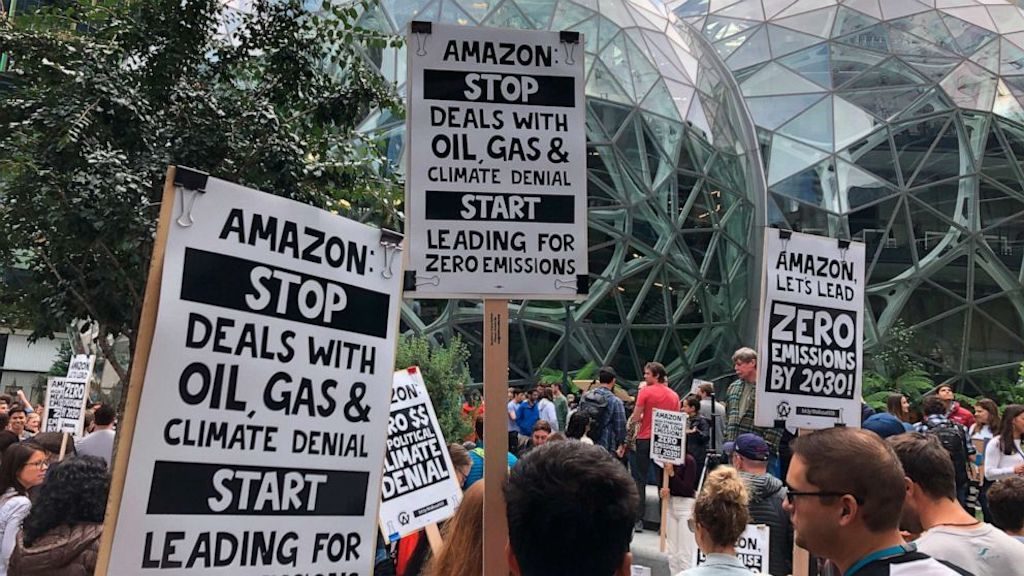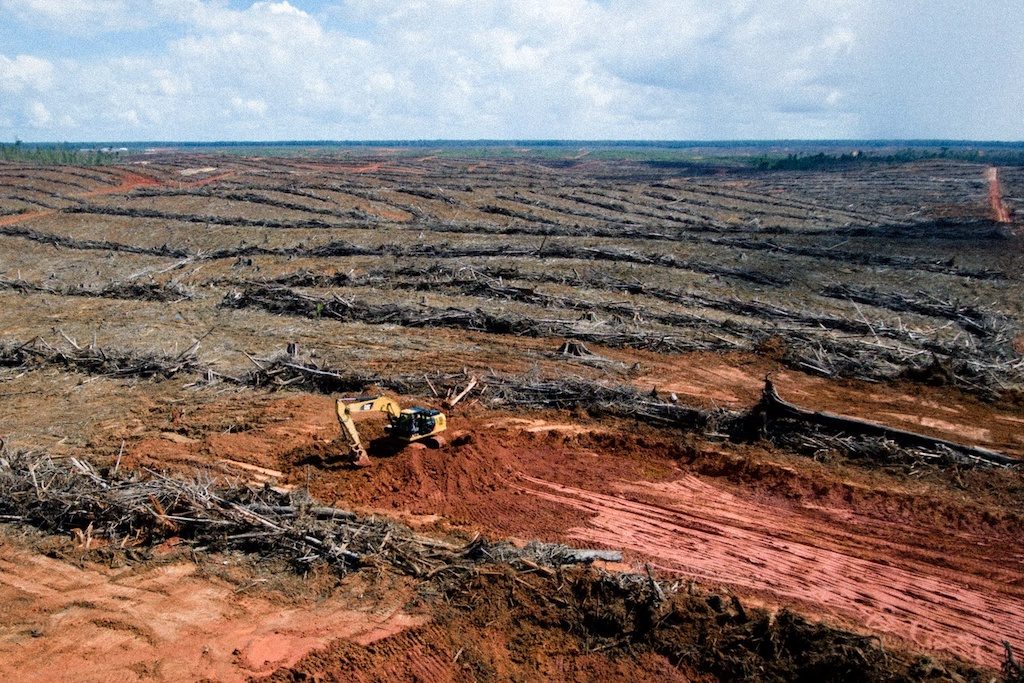7 Mins Read
The Manhattan-headquartered global business and market news and data analysis company Bloomberg has just announced the launch of Bloomberg Green, the firm’s editorial brand dedicated to climate change news. While the move to debut a separate and brand new platform to showcase the latest findings and stories on our climate emergency is a win in terms of raising the global awareness on the most urgent issue facing our planet today, questions remain open how transparent and impartial the platform’s reporting on the crisis will be given that as Green Queen investigation, it has become apparent that Bloomberg Green will be backed by a group of multinational companies responsible for significant environmental and social damage on the planet and people.
Over the past year, from the high-profile global youth climate strikes to the worldwide media campaign Covering Climate Now (CCNow), the topic of the climate emergency has been promulgated into the forefront of our attention. Amid the ramped up awareness on the climate in the global agenda, Bloomberg’s editor-in-chief John Micklethwait announced the creation of Bloomberg Green, a separate editorial brand on a mission to become an “indispensable guide” to document the inevitable climate-induced transformations and sustainable solutions to come.
In the announcement, Bloomberg Green will be using its parent company’s tools and resources in data collection, analysis and reporting to highlight the latest sustainability and climate-related events. On their site, the webpage features a clear “carbon clock” showcasing how much carbon dioxide the Earth’s atmosphere contains, and how close we are to reaching complete destruction. When it debuted, the platform dished out reports on some of the pioneers of climate solutions, an analysis into the evacuation camps used for the Australian wildfires, and how China’s ban on waste imports have affected the world’s waste management system. The multifaceted climate-focused platform will also include podcasts and a magazine, as well as collaborate with the company’s media channel umbrella, such as Bloomberg Radio and Bloomberg Television.
On the outset, the launch of Bloomberg Green is a major step change for the coverage of climate news and will help push the climate crisis to the top of the priority concerns for everyday readers, the media landscape and business and government leaders. In this respect, the platform represents an incredibly positive mission to direct global eyes towards combating the most urgent issue the planet faces, which is set to impact everything from physical security and livelihoods to international economies.
However, when we delve into the founding partners that will be powering the new editorial brand, a number of questions emerge about how the platform will maintain transparent and independent scrutiny and reporting over corporations, which hold enormous power in the transition to a much-needed zero-carbon economy.
According to a press release by their parent company, the founding partners of Bloomberg Green include multinational tech giant Amazon, IT and software corp HP Inc., real estate firm JLL, asset management company PGIM and the prestigious jewellers Tiffany & Co. While not every name on the list of partner companies is associated with a poor environmental, social and governance track record, certain names merit a double-take.

Tech giant Amazon, the first of Bloomberg Green’s founding partners, is no stranger to criticism over its lukewarm commitment to environmental protection. From threatening to fire employees for speaking about climate change to being the masterminds behind billions of packaging waste through its e-commerce retail arm, Amazon can hardly be considered a champion for sustainability.
- While Amazon’s CEO Jeff Bezos was preoccupied with hosting a lavish party over the past weekend—attended by Ivanka Trump and Bill Gates—over 300 of his employees staged a public statement protest in their own names to criticise the company’s moral irresponsibility over climate change, in defiance of a corporate external communications policy that bars workers from talking about business without prior authorisation.
- The external communication policy was introduced after a number of employees from Amazon attended the global climate strikes last year, and demanded Amazon to end contracts with oil and gas companies.
- Amazon Employees for Climate Justice have been pushing Amazon to adopt more environmentally-friendly policies, but at least 3 members have been threatened with termination for their action.
- Last April, Gizomdo reported that Amazon Web Services, the tech giant’s cloud computing arm had been making aggressive partnerships with a number of non-renewable energy companies, and upon protest from employees, Bezos reiterated that the branch will not end business with the fossil fuel industry.
- Amazon’s online retail arm is responsible for so much waste and emissions that it has been dubbed “the Amazon effect”—orders have more than doubled in recent years, and that has led to a colossal spike in greenhouse gases and landfill and ocean waste due to transportation and packaging, not to mention the allegations of problematic human rights abuses of its warehouse workers.

Another founding partner, global asset management and investment firm PGIM Inc., part of the American life insurance company Prudential Financial, has been accused of funding some of the most lucrative and environmentally damaging industries in the world.
- According to non-profit Deforestation Free Funds, a number of financial investment plans under PGIM have been associated with deforestation-risk holdings and projects.
- Some of these include the firm’s Jennison Blend Fund, which the organisation gave an F rating to for investing a total of over US$113 million in 18 different deforestation-linked companies and projects. Most of these are from within the consumer goods sector (think Nike, Amazon and Walmart), and most have been caught sourcing a number of commodities in their products from suppliers associated with deforestation practices.
- Another fund under PGIM, the Jennison Small Company Fund, has directly channeled a portion of investment into Adecoagro SA, a Brazilian agro-industrial company producing office paper and soybeans, named one of the “Sleeping Giants” responsible for deforestation in a Forest 500 report.

American luxury jewellery and specialty retailer Tiffany & Co. is a founding partner of the sustainability-focused editorial platform too, which seems to run counter its mission, given the very nature of the precious stone industry. The latter has long been mired in headlines touting its problematic procurement, poor ethical record and lax environmental practices, all of which have caused a not insignificant amount of environmental and social damage.
- In an allegation in 2015, the brand was accused of sourcing diamonds from the Octea Diamond Group, a Beny Steinmetz Group Resources (BSGR) company based in Sierra Leone, which has funded the Givati Brigade, a unit of the Israeli army that has been accused of war crimes.
- While the brand has tried to distance itself from the link, responding that the particular supplier in question in Sierra Leone is operated by Koidu Limited and that Tiffany & Co. condemns human rights abuses of any kind, it appears as though Koidu Limited is still linked to BSGR as an indirect subsidiary.
- In addition, the diamond extraction and precious stone mining industry comes with plenty of detrimental impacts on the natural environment, including soil erosion, deforestation and destruction of the ecosystem.
The other founding partners listed do appear committed to sustainability in several respects. HP Inc., for instance, has over the years created water-based ink technologies and sustainable printing systems, and has also partnered with the World Wildlife Fund (WWF) for a US$11 million forest cooperative focused on protection and restoration of forests.
Commercial real estate giant JLL, on the other hand, has been actively promoting greener net-zero building designs to lower carbon emissions and resource wastage. The company’s own office in Hong Kong has been awarded the LEED platinum certification for the highest score in the city and second-highest score globally for the green interior design category.
Indeed, while these other founding members powering Bloomberg’s new climate news and analysis platform do appear to align with its sustainability-focus, the reality is that having the backing of some of the world’s biggest corporations—who hold immense power to drive structural changes for the climate—may hamper the independence of the editorial.
In comparison, other media outlets dedicated to upholding journalistic independence to deliver impartial news on the climate crisis have remained transparent about funding. The Guardian for instance, one of the largest partners of the Covering Climate Now that unites over 300 media outlets globally in a bid to push for more climate-related coverage, has recently publicised that they will ban any advertising from fossil fuel firms.
Trustworthy media has never been more vital in today’s environmental and political climate, where readers and listeners have become increasingly doubtful about the true authenticity and accuracy of reporting. In the midst of the climate emergency, it is not only crucial that the attention and profile of the issue is being raised, and to that end, Bloomberg Green is certainly helping the cause, but it is equally crucial that the editorial remains true to its commitment to call out the culprits, including large corporations, who are backing the most polluting operations of today.
Lead image courtesy of Kyle Grillot / AFP / Getty Images.




